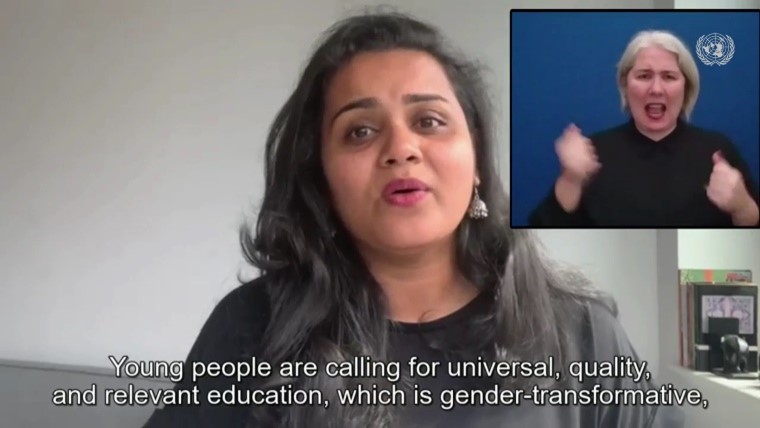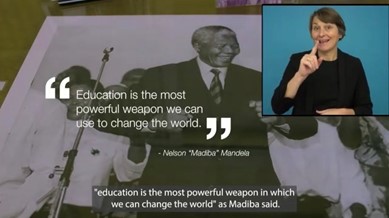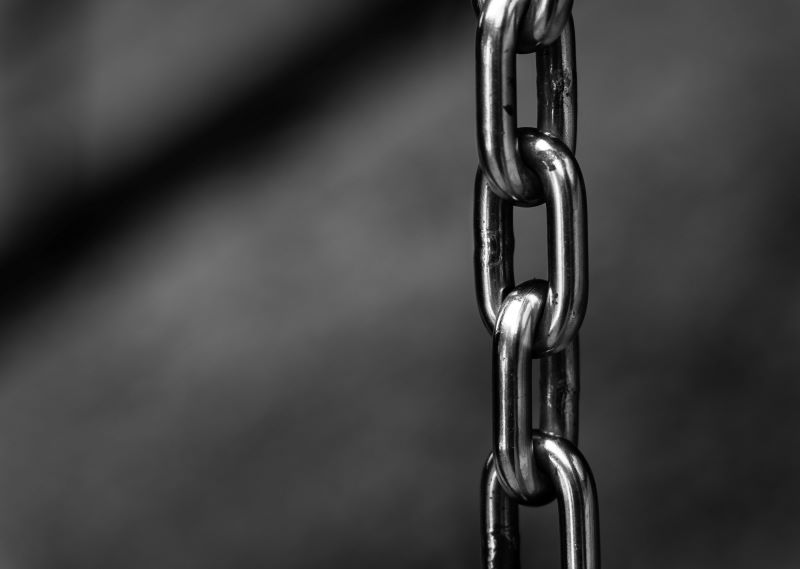The 48th Session of the Human Rights Council
13 September - 8 October 2021
ITEM 3: Promotion and protection of all human rights, civil, political, economic, social, and cultural rights, including the right to development
High Level Panel on the Tenth Anniversary of the United Nations Declaration on Human Rights Education and Training (HRC res 42/7)
(29 September 2021)
By: Alicia Louise/GICJ
Executive Summary

At the 25th meeting of the 48th session of the Human Rights Council, a High-Level Panel was convened to discuss best practices, obstacles and the future of human rights education and training 10 years after the adoption of the United Nations Declaration on Human Rights Education and Training (Res. 42/7). The panel discussion focused on human rights education (HRE) and training for youth, aged 15-24.
In the context of the COVID-19 pandemic, panellists viewed the dialogue as an opportunity to remind States of their obligations towards the fulfilment of the 2030 Agenda and Sustainable Development Goal 4.7, allowing the youth to take the lead in developing policies and programmes that affect them. Particular attention was given to how prioritize the return of young people to in-person learning, and provide gender-transformative, safe, inclusive education that also addresses climate change concerns proactively. Regarding youth, panellists recalled the obligations of States to invest in their public education systems and teacher training centres, so that children can develop respect for human rights and fundamental freedoms.
Geneva International Centre for Justice believes the incorporation of human rights education and training is essential in all areas of public life. Rights-awareness must begin as early as possible to become integrated standards for adults and children, and to ensure access to recourse when they are victims of human rights violations.
Background
Nowadays, it is widely accepted that human rights education and training must form an essential part of one’s lifelong learning. Numerous international human rights instruments, resolutions and other documents provide guidelines and recommendations for public and private sector in human rights education and training at all levels.
While the World Programme on human rights training and education in UNGA (Res. 59/113) provides a framework for global human rights education, other requirements are found in several international human rights treaties. Article 26 (2) of the Universal Declaration of Human Rights sets out the legal standard(s) for education delivery by and within States; Article 5 of the UNESCO Convention against Discrimination in Education provides that education “shall promote understanding, tolerance and friendship among all nations, racial or religious groups”; Article 7 of the International Convention on the Elimination of All Forms of Racial Discrimination calls for immediate and effective measures by States Parties in human rights education, to combat the prejudices that fuel hatred in our societies. Other human rights instruments are designed to guide and hold States accountable for promoting and guaranteeing the right to education and human rights for all.
High Level Panel Discussion
Opening Statements
The United Nations Commissioner for Human Rights (UNCHR), Michelle Bachelet, stated that safe and enabling learning environments are essential for all stakeholders, including educational institutions, civil society organisations, national human rights institutions, and the private sector. Ms Bachelet explained that HRE equips individuals with critical thinking skills, knowledge and attitudes that help them identify, claim and defend human rights, as well find solutions to serious challenges that reflect human rights values. Recognising youth as more digitally aware and interconnected than previous generations, the UNCHR believes today’s youth display a remarkable knowledge of world affairs and have unprecedented capacity to mobilise their peers to action. Moreover, youth are shepherding the way in demanding institutional and policy change, for a just and sustainable world. Ms Bachelet reminded the Council of the UN Secretray General's Youth Strategy 2019, which makes the entire UN system responsible for improving HRE and training for youth. Currently, we are in the HRC’s 4th phase of work from 2020-2024 of the World Programme for HRE, which is dedicated to young people.
Assistant Director-General for Education at the United Nations Educational, Scientific and Cultural Organisation (UNESCO), Stefania Giannini, cited Article 2 of the Declaration which calls for education about human rights, education through human rights and education for human rights. Ms Giannini commented that education is crucial for human dignity, realisation of one’s rights and respect for democracy. However, it is threatened by today’s inequality, exclusion and denial of human rights. The Assistant Director-General stated that due to COVID-19 human rights abuses have increased, including violence against women and hate speech which have significantly impacted children’s learning and wellbeing worldwide. Despite this, Ms Giannini believes international solidarity can empower us to “build back better”.

UN Secretary General’s Envoy on Youth, Jayathama Wickramanyake, expressed great frustration about young people being routinely overlooked during decision-making processes that determine whether we breakdown, or breakthrough the current health crisis. Ms Wickramanyake requests greater solidarity by ensuring meaningful, diverse and effective youth engagement in all areas, including at the UN, national, regional and international levels.
Commissioners of the Commission on Human Rights of the Philippines, Ms Gwendolyn Ll. Pimentel-Gana and Ms Leah C. Tanodra-Armamento, acknowledged that while youth engagement in HRE and training has been greatly improved through technology, apps and social media, a large proportion of the world’s youth have still no access to devices or internet services. With more than a quarter of the Philippines aged between 10 and 24, Ms Pimentel-Gana stated that the nation’s major challenge is the lack of access to education, and the challenge of dispelling myths about human rights. She stated that before the pandemic, the Philippines had consistently high rates of school drop-out, with children regularly skipping school to work for their families. The Commissioner expressed deep concern about COVID-19 restrictions imposed nationally, which keep some 27 million students out of in-person classes. However, the Commissioners reminded us of other valuable methods for youth engagement in HRE and training, as well as the great importance of involving faith-based and civil society organisations in such process.
Youth Activism Programme Manager at the Ahmed Kathrada Foundation, Irfaan Mangera, stated that outside of formal institutions, young people are looking for hope and spaces to make sense of the world and their identity. Mr Mangera shared best practices of the youth activism programme at the Kathrada Foundation, where they encourage various forms of learning throughout a sense of community and collective spirit. Young people undertake leadership training and engage with informal learning opportunities to understand the past with the aim of renewing their sense of commitment to championing changes within their communities. Such approaches have empowered local youths. Mr Mangera concluded that HRE should be multifaceted and taught through an intersectional approach, including democratic civil participation and environmental studies. Additionally, it is crucial to teach youth how to tackle discrimination and access mental health services.
Board Member of Universidad Estatal a Distancia de Costa Rica, Mr Muñoz Villalobos
highlighted the importance of learning from the past, encouraging countries with a colonial and enslaving history to use their past as an educational opportunity. Mr Villalobos also insisted that any form of education discriminating women and LGBTQI+ persons must be rejected unanimously by the international community.
Country Responses
The representative for the Dominican Republic highlighted the efforts made by the nation’s educational community to establish a curriculum for students in poverty, allowing children to continue learning throughout the pandemic. Additionally, the access to various technological tools and a digital platform for remote learning as well as indispensable assessment instruments and didactic resources has been facilitated. Yet, many obstacles are faced in maintaining access to education for the most vulnerable and impoverished children, for which the support and collaboration of the international community is crucial.
Libya called for the cooperation between the OHCHR, UNESCO and Libya in HRE, especially considering the difficulties the country is facing with national reconciliation, social justice, the rule of law and democracy. In this regard, Libya requested the assistance of the international community.
The United States asked how the OHCHR plans to enhance HRE for at risk and vulnerable individuals, including persons with disabilities, LGBTQI+ persons, members of marginalised racial and religious groups, and others in challenging situations.
Venezuela (Bolivian Republic of) highlighted that according to the Plan de la Patria of 2019-2025, the country aim at promoting and mobilising HRE in education centres and universities. The representative also mentioned the establishment of a national human rights school in 2018, which has a standing forum of advanced studies for training, capacity building, research and dissemination of human rights topics. The school is responsible for providing theoretical and practical human rights training through a critical perspective while being ethically responsible and maintaining social relevance with a profound knowledge of national and international realities. The representative further expressed the desire to build a human rights culture which upholds positive processes of social change to achieve a proactive and participative society.
Civil Society Organizations
Most civil society organizations pointed out the importance increasing investment to improve the quality of HRE and training, especially in conflict and post-conflict zones. In such area the involvement of NGOs is crucial. In fact, many organizations collaborate and fund training institutions and universities, regularly organise seminars, workshops, and research projects which can help and support governments to provide quality HRE and training. The key role of youth engagement in such process has been also brought up by one organization, highlighting that 85% of people who took action for human rights were youth in 2020. However, young people are facing growing challenges, such as discrimination and arbitrary restrictions on their freedom of expression, assembly and association. An NGO advocated that young people should be able to design, lead and implement changes in HRE programmes with the aim of addressing human rights violations and abuses, including those exacerbated by COVID-19 and climate change.
Further to this, one NGO highlighted how misinformation and fake news on online platforms have dangerous consequences in the off-line world. A clear example is the rising in hate speech and anti-Semitism sentiment in the digital sphere which undermines social cohesion and generates physical and psychological violence within communities. In this regard, it is crucial to equip online audiences with suitable tools and knowledge to deal with hate speech, including the ability to distinguish between conspiracy myths and historical truth to prevent radicalism and extremism.
Concluding Remarks
Minister of Education, Science and Sports in Slovenia, Ms Simona Kustec, stated that HRE needs to be “our common goal and everyday challenge”. In this regard, the Commissioner of the Commission on Human Rights of the Philippines, Leah Tanodra-Armamento invited States to strengthen international and regional collaboration, and learn from each other’s best practices. She also highlighted the importance of using human rights educators more effectively, improving accessibility and inclusion for all students, especially considering that the pandemic has significantly altered the way learning takes place. The digitalization of our society deemed necessary working together to combat misinformation and fake news, also to protect human rights violations and buses directly or indirectly linked to the digital realm. To conclude, it is crucial to actively and democratically include the youth in all spheres of public life.

Mr Villalobos urged States to comply with their obligation to fund national education system, with a view also in enhancing teacher training. Mr Villalobos also pointed out that human rights learning must be promoted through and implemented by the public policy system, because a human rights culture will not be fully in place as long as institutions discriminate and spread hate within their communities. In this regard, States should take action to guarantee equal opportunities for young people, with specific attention to women, persons with disabilities, and vulnerable persons so they can be fully involved in the public sphere and education system.
To conclude, Mr Mangera reiterated the right of young people to play, learn and develop even when under the intense and growing threat of violence. More work is required to ensure the rights, freedom and values of future generations, beginning this work at a localised level before expecting national or regional changes.
Position of Geneva International Centre for Justice
Geneva International Centre for Justice reiterates the importance of incorporating human rights education and training in all areas of public life, so that the ‘real world’ resembles what children have been taught in their classrooms. There are also human rights violations that occur in schools and college training environments today, which are extremely detrimental to the human rights principles we want to promote. For instance, corporal punishment is still a phenomenon that occurs in schools throughout the Caribbean, which greatly undermines the substance of HRE and training. Moreover, the threat of terrorism, armed gunmen, environmental hazards, discrimination, inaccessibility for students with disabilities and so much more, are antithetical to the fundamental human right to education. In order to achieve the aims of our international human rights obligations, the international community must work hard to eliminate these artificial and physical barriers to education. We look forward to further discussions on these matters, and positive actions to follow.
Justice, Human rights, Geneva, geneva4justice, GICJ, Geneva International Centre For Justice
Previous Reports from the 48th Session of the UN Human Rights Council
 |
 |
 |
 |
Human Rights Consequence of the Military Coup in Myanmar |
The Right to Development |
Human Rights Situation in South Sudan |
Report on slavery: causes and consequences |







